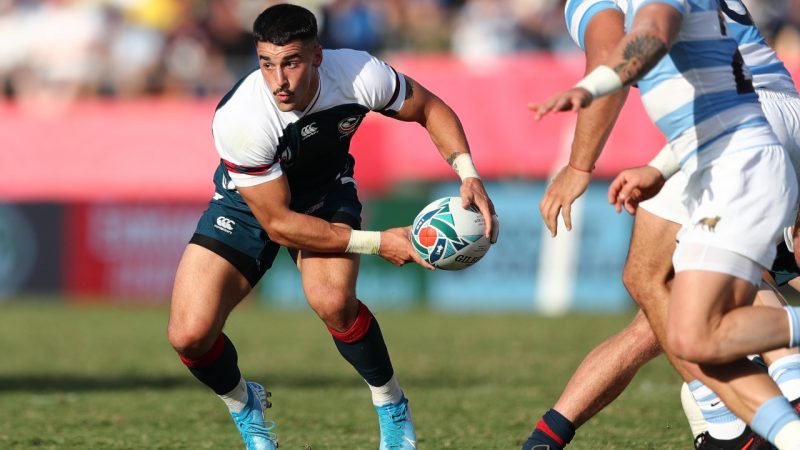Red and gold streamers shot like fireworks across the Welsh Rugby Union training grounds in Pontyclun, Wales, as team captain Alun Wyn Jones held aloft the Six Nations Tournament trophy, flanked by medal-wearing teammates in red. Unlike most championship victories, Wales did not actually play in the game that deemed them winners. Rather their status as 2021 champions was solidified the day before, when fourth-place Scotland bested France in the final round of the tournament, knocking France to second place and securing Wales’ first place.
While the tournament ended happily for Wales in the end, the final minutes of the playing time for Wales weren’t anything like the jubilant celebration of that Saturday afternoon; quite the opposite. Just one week earlier, Wales had suffered a heartbreaking and sudden loss to France, a defeat that quickly marked the start of an even bigger battle for the team.
>> Subscribe to Sports Spectrum Magazine for more stories where sports and faith connect <<
On March 20, the week before winning the championship, Wales went head-to-head with France in Round 5 of the tournament, a game that kicked off with both high stakes and high energy. Wales had been marching through the tournament with strength and success, winning the Triple Crown after defeating England, Scotland and Ireland. A Welsh victory over France would mean not only winning the tournament, but also a Grand Slam victory with an undefeated tournament record. A French victory, however, would extend the tournament a week, leaving Wales’ fate in the hands of a Round 6 game, Scotland vs. France.
Within the first 20 minutes, the score was 14-14 as each team answered try with try in rapid-fire succession. The emotional momentum only grew with tense exchanges with officials, tries missed by inches, tries improperly grounded, and points contested and overturned. Playing time grew scarce with a Welsh 10-point lead, a French red card, and even a commentator declaration of Welsh victory.
However, with just 10 minutes remaining, two contentious yellows cards left Wales out-manned. Riding a sudden shift in momentum, the French intensified the pressure at the goal line to a relentless fervor, and dispatched two tries with just minutes to play — a sucker-punch of a loss to previously-undefeated Wales.
In an instant, Wales lost not only the game, but the Grand Slam title. The tournament victory that had seemed so firmly in their grasp just minutes earlier now stood in jeopardy. After the game, head coach Wayne Pivoc described the general feeling of the team as “numb.” Photos and footage of reeling players, heads in hands, began to emerge online. As players struggled to put their devastation into words in postgame interviews and social media alike, angered fans had no trouble giving voice to their feelings, and quickly took aim at the players.
By the next morning, the Welsh Rugby Union’s official Twitter account released a screenshot of six vitriolic messages fullback Liam Williams had received from fans. The caption read, “The players are proud to represent their country and their jersey. The abuse players are receiving has to stop. This is a tiny example of the abuse just one player received last night. #bekind #fulltimeabuse.” The profanity-laden rants pictured in the tweet blamed Williams’ yellow card for costing Wales the game, berated his performance in the game, and attacked him personally, calling him bow-legged.
In response to confronting this online negativity, support for the team and its players began to pour in. Even the official France Rugby Twitter account tweeted in response: “All our support dear friends… This is not the true Spirit of sport and this has to stop. Congratulations again on the great performance of your team yesterday.” By Monday afternoon, “Mrs. Higgins,” a Year 5 teacher (the UK equivalent of fourth grade) posted samples of positive tweets her students had spent the afternoon writing to Liam Williams to cheer him up, using the hashtag #teachkindness.
#BeKind… just like Year 5! https://t.co/ISyaAyK5mF
— Welsh Rugby Union
(@WelshRugbyUnion) March 22, 2021
In the simple act of calling out abusive fans, WRU had not only started a conversation about online bullying, but created a teaching moment for rugby fans young and old. While Wales would not taste tournament victory until Scotland’s victory on the following Friday, nor lift the trophy until Saturday, Wales had already turned a tide of ugliness into positive, productive redemption.
The Welsh Rugby Union’s actions in the aftermath of their loss provide a valuable reminder for more than a class of Welsh fourth-graders. In refusing to tolerate these hurtful words, the WRU affirmed the dignity of athletes as image-bearers of God. The separation of athlete from spectator by screen, celebrity, and often millions of dollars, can have a dehumanizing effect. However, the age of social media enables those fans to reach through the screens and touch the human on the other side, for better or worse. Angry fans yelling at the screens from their living rooms mentally strip the players of their humanity, but when they hit “send” on their tweets and messages, their words have the power to further injure and harm the already-dejected and devastated players like Liam Williams. No matter the event, the emotions or the entertainment factor, these players are beloved creations of the almighty God, made in His image and must be treated as such.
In taking a stand against bullying, the Welsh Rugby Union also demonstrated the warning of Luke 8:17: “For there is nothing hidden that will not be disclosed, and nothing concealed that will not be known or brought out into the open.” An online profile can create a perceived sense of anonymity, often bringing out ugliness in a person that would never manifest with an exposed identity. This is why the term “troll” is so appropriate to describe this kind of online behavior. A troll in the mythological definition, is ugly and scary under the cover of darkness, but turns to stone when exposed to the sunlight. In publishing those screenshots, the WRU exposed these trolls, disarming them of their power.
Reflecting on the tournament, and particularly its harrowing final week, Coach Pivoc said it was a “very special Six Nations Tournament for the whole group, and one we’re going to be very proud of when we look back.” From an athletic standpoint, Wales certainly has much to be proud of, but at the end of it all, this Welsh victory is a little sweeter, because the victory goes deeper than a trophy and the fruit of their efforts, more lasting than points.
RELATED STORIES:
— THE INCREASE: The Power of Life or Death is in Your Words – USA Rugby’s Nate Augspurger
— U.S. rugby star Joe Taufete’e lives out Christian faith as he leads Eagles in Rugby World Cup
— South African captain Siya Kolisi trusts in God as 2019 Rugby World Cup begins



 Gold Medal Clicks.
Gold Medal Clicks.

